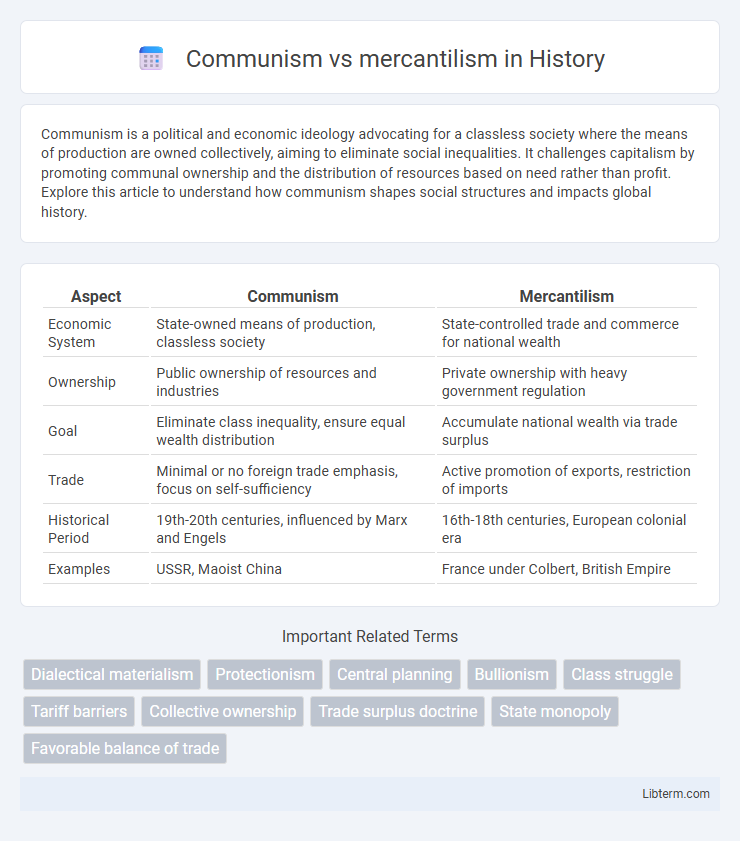Communism is a political and economic ideology advocating for a classless society where the means of production are owned collectively, aiming to eliminate social inequalities. It challenges capitalism by promoting communal ownership and the distribution of resources based on need rather than profit. Explore this article to understand how communism shapes social structures and impacts global history.
Table of Comparison
| Aspect | Communism | Mercantilism |
|---|---|---|
| Economic System | State-owned means of production, classless society | State-controlled trade and commerce for national wealth |
| Ownership | Public ownership of resources and industries | Private ownership with heavy government regulation |
| Goal | Eliminate class inequality, ensure equal wealth distribution | Accumulate national wealth via trade surplus |
| Trade | Minimal or no foreign trade emphasis, focus on self-sufficiency | Active promotion of exports, restriction of imports |
| Historical Period | 19th-20th centuries, influenced by Marx and Engels | 16th-18th centuries, European colonial era |
| Examples | USSR, Maoist China | France under Colbert, British Empire |
Introduction to Communism and Mercantilism
Communism is a political and economic ideology advocating for classless society, collective ownership of production means, and wealth distribution based on need. Mercantilism is an economic theory and practice dominant in Europe from the 16th to 18th centuries, emphasizing state control over trade, accumulation of wealth through a positive balance of exports, and colonial expansion. These systems fundamentally differ in ownership structures and economic goals, with communism focusing on equality and mercantilism prioritizing national economic power and resource accumulation.
Historical Origins of Communism
Communism originated in the 19th century as a response to the inequalities produced by early capitalist and mercantilist systems, heavily influenced by the writings of Karl Marx and Friedrich Engels. Its historical roots trace back to critiques of exploitative labor conditions and the concentration of wealth among mercantilist and capitalist elites. Unlike mercantilism, which emphasized state-controlled trade and accumulation of wealth through colonization, communism advocates for the collective ownership of production means to abolish class distinctions.
Historical Beginnings of Mercantilism
Mercantilism originated in the 16th century during the rise of nation-states in Europe, emphasizing state regulation of the economy to maximize national wealth through trade surplus and accumulation of precious metals. This economic doctrine led to protective tariffs, colonization, and monopolistic companies to control resources and markets. Unlike communism, which emerged as a critique of capitalist exploitation in the 19th century, mercantilism laid the groundwork for modern economic nationalism by linking wealth directly to state power.
Core Principles of Communism
Communism is founded on principles of collective ownership, where the means of production are controlled by the community or state to eliminate class distinctions and ensure equal distribution of wealth. It emphasizes central planning and the abolition of private property to achieve social and economic equality. This contrasts sharply with mercantilism, which centers on state-controlled trade and accumulation of wealth through protectionist policies to strengthen national power.
Fundamental Tenets of Mercantilism
Mercantilism fundamentally emphasizes a positive balance of trade, advocating for export surplus to accumulate national wealth measured in precious metals like gold and silver. It promotes strong government intervention through tariffs, subsidies, and monopolies to protect domestic industries and control colonial resources for economic advantage. The system prioritizes national self-sufficiency and wealth accumulation through regulated trade policies, contrasting sharply with communism's collective ownership and planned economy principles.
Economic Structures: Communism vs Mercantilism
Communism features a centrally planned economy where state ownership controls production and distribution to achieve equality, eliminating private property and market competition. Mercantilism emphasizes state control over trade and accumulation of wealth through protectionist policies, promoting exports while restricting imports to build national economic strength. The fundamental difference lies in communism's goal of classless distribution versus mercantilism's focus on wealth accumulation and national power through regulated commerce.
Political Implications and Governance Models
Communism advocates for a classless society with state ownership of resources, promoting centralized political control to achieve economic equality. Mercantilism supports strong state intervention to accumulate wealth through trade surplus, emphasizing national power and protectionism within a hierarchical governance structure. The political implications of communism involve dismantling capitalist institutions, while mercantilism reinforces existing power dynamics through economic nationalism.
Impact on Trade and Global Relations
Communism, emphasizing state control and planned economies, often restricts trade with capitalist countries, limiting global market integration and fostering economic self-reliance over international competition. Mercantilism prioritizes accumulating wealth through trade surplus, promoting aggressive export policies and protecting domestic industries, which historically led to colonial expansion and intensified global rivalries. The contrasting approaches shape international relations by influencing trade alliances, economic cooperation, and geopolitical tensions between state-driven control and market-driven competition.
Social Outcomes and Class Dynamics
Communism emphasizes the abolition of class distinctions through collective ownership of production, aiming to eliminate social inequalities and establish a classless society. Mercantilism reinforces hierarchical class structures by concentrating wealth and power among the merchant and ruling classes, often exacerbating social stratification and limiting upward mobility. Social outcomes under communism focus on redistribution and shared prosperity, whereas mercantilism tends to sustain economic disparities and reinforce existing class dynamics.
Contemporary Relevance and Criticisms
Communism faces criticism today for its lack of economic incentives and inefficiencies in resource allocation, often leading to stagnant growth and limited innovation, while its contemporary relevance persists in discussions of wealth redistribution and social equity. Mercantilism, largely obsolete as an economic system, is critiqued for fostering protectionism and trade wars, yet its principles echo in modern nationalist trade policies and government intervention in markets. Both systems provoke debate on balancing state control with market freedom in shaping equitable and sustainable economic outcomes.
Communism Infographic

 libterm.com
libterm.com